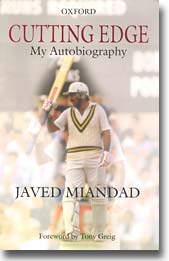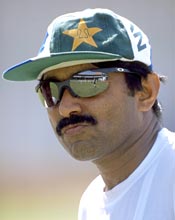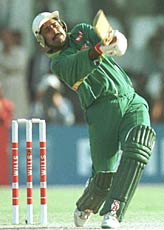
Home > Cricket > Interview
The Rediff Interview/Saad Shafqat
'Javed would much rather
cheer for the underdog'
June 18, 2003
Karachi-based neurologist Saad Shafqat recently completed work on the autobiography of Javed Miandad, titled The Cutting Edge.  Like any other warm-blooded South Asian, cricket has always been a passion for him. New Zealand's visit to Pakistan in 1976-77, the series in which Javed Miandad burst on to the international scene, had a huge impact on Saad, who was just 11 years old then. Like any other warm-blooded South Asian, cricket has always been a passion for him. New Zealand's visit to Pakistan in 1976-77, the series in which Javed Miandad burst on to the international scene, had a huge impact on Saad, who was just 11 years old then.
Between 1989 and 2000, Shafqat lived in the United States, where he got a PhD in neurology. But the US is a cricketing wilderness and it was a great comfort for Shafqat when he found that he could follow his beloved game on Web sites like rediff.com and Cricinfo. In 2000, Shafqat returned to Pakistan and took up the post of assistant professor of neurology at the Aga Khan University in Karachi. In an interview with Faisal Shariff, he relives the experience of writing Miandad's autobiography with the legendary batsman who, he says, helped himself to liberal doses of paan masala while working on the book. Excerpts: Where did the idea for the book germinate? Like any avid cricket follower, I had been looking forward to Javed Miandad's autobiography ever since his retirement in 1996, but years passed by and... nothing. In July 2000, I returned home to Karachi after finishing my medical studies in Boston. One of the first things I did after settling into home and job was to get hold of Miandad's mobile number and call him, offering to help write his memoirs. How much time did it take you to complete the book? The interviews with Javed lasted about six months, after which it took me a year to finalise the manuscript. We gave it to the publishers in September 2002 and it was finally ready in print in May 2003. How did you and Miandad work on the book?  It was great fun. I used a micro-cassette recorder with a detachable microphone and recorded conversations with Javed approximately once a week for six months. The line of questioning was very open-ended and followed the general chronology of his career. All his Test and ODI scorecards as well as several Wisdens from the 1970s and 1980s would always be at hand. He would frequently go off at tangents, which usually resulted in the most interesting details. He was mostly talkative, but sometimes he was distracted or tired and it was hard to get him going. At these moments a healthy dose of paan masala [an Indian import] and several minutes of idle chatter could work wonders. It was great fun. I used a micro-cassette recorder with a detachable microphone and recorded conversations with Javed approximately once a week for six months. The line of questioning was very open-ended and followed the general chronology of his career. All his Test and ODI scorecards as well as several Wisdens from the 1970s and 1980s would always be at hand. He would frequently go off at tangents, which usually resulted in the most interesting details. He was mostly talkative, but sometimes he was distracted or tired and it was hard to get him going. At these moments a healthy dose of paan masala [an Indian import] and several minutes of idle chatter could work wonders.
Most of the interviews were in Karachi, either at his mother's home or mine. I also met him for a few sessions at his residence in Lahore, and a couple of times at his flat in London when we were both there for the Pakistan visit in May-June 2001. I transcribed the tapes myself and wrote out the manuscript as I went along. Javed and one of his sisters-in-law [an English teacher in Karachi] went through each chapter as it was ready and suggested the occasional change. Since when have you known Miandad? I didn't know him before doing the book. I first spoke with him in late 2000, when he was the national coach during England's 2000-01 tour of Pakistan. A common friend of ours facilitated the contact. Javed was polite with me, but, at first, dismissive. After some persistence, however, he agreed to see me. I had written a 6,000-word profile of him that I showed him and that he shared with his wife Tahira. I urged him to let me write his story, but he didn't give any definite answer then. In April 2001, after he had returned from a tour of New Zealand and resigned as the Pakistan coach, he called me to say he wanted to go ahead with the book. I know he had offers from the UK to get his autobiography done over there, but he wanted his book to be accurate and true to subject, which a UK product obviously wouldn't be. Players like Zaheer Abbas, Imran Khan, and Wasim Akram had published their autobiographies from the UK with English co-authors, and Javed felt those books lacked an intrinsic Pakistani or desi feel. He wanted to do something more along the lines of Sunny Days [Sunil Gavaskar's autobiography], a genuine subcontinental classic. Which is your favourite chapter in the book? Being an incurable romantic, the chapter I most enjoyed discussing with Javed was the first one, about his life as a child growing up in Karachi and getting an early start in cricket. It greatly moved me to contemplate how as a little boy Javed had played his strokes in Karachi's crowded streets and its dusty playgrounds, and little did anyone know that one day this same little boy would play the same shots in some of the great Test centres of the world, against some of the most feared and famous bowlers, and in the process push the limits of cricket achievement so far that ultimately the image of an entire nation's cricket would be redefined. The chapter I most enjoyed writing was 'Top of the World', about winning the 1992 World Cup, which let me relive the whole experience. And the chapter I most enjoyed reading was 'Australian Rules Cricket', which is about Javed take on touring Australia. Which is Miandad's favourite chapter in the book?  I'm pretty sure the one he most enjoyed narrating was 'Sharjah', which revolves around his famous last-ball six, but covers a lot of other ground as well. He also greatly enjoyed doing the chapter 'Wars with India', which is provocatively titled [laughs], but which I think conveys well the soft corner Javed -- and indeed the silent Pakistani majority -- feels for India and Indian fans. I'm pretty sure the one he most enjoyed narrating was 'Sharjah', which revolves around his famous last-ball six, but covers a lot of other ground as well. He also greatly enjoyed doing the chapter 'Wars with India', which is provocatively titled [laughs], but which I think conveys well the soft corner Javed -- and indeed the silent Pakistani majority -- feels for India and Indian fans.
I know that the chapter he has most enjoyed reading is 'In Search of 365', which deals with the most prolific batting period of his career, between 1987 and 1989. One day during the recording sessions, he told me to put together a list of his scores starting from his 260 against England at the Oval in 1987 through to his 271 against New Zealand at Auckland in 1989. I quickly put together the list and showed him, and he kept poring over it for a long time. It had got him into the right mood and that whole chapter flowed out effortlessly. The chapter on Imran Khan seems to be very diplomatically written. How much was edited out? Javed and Imran have an extremely complex relationship, which I think no outsider can claim to fully comprehend. Part of the complexity is having layers and layers of mixed feelings towards each other. I think Javed admires and loathes Imran in equal measure and probably Imran does the same. Javed would have loved to have Imran's societal trappings and Imran would have given an arm and a leg for Javed's cricketing brain. But when it came to playing for Pakistan, they were both in full agreement and cooperated 100 per cent to pool their resources and start winning outside Pakistan. In the chapter on Imran, Javed made a very conscious effort to be as fair to Imran as possible. This may come across as diplomatic, but that is certainly not his intention. He is just giving Imran his due. Nothing from that chapter has been edited out, I can assure you. The match-fixing allegations in the book -- how difficult was that for you to write? Was there anything new other than what Miandad has already told the Qayyum Commission? I followed Javed's instructions. He wanted to address match fixing to the extent that it was relevant to the narrative. He has a commonsense take on the whole thing, summarized on pages 278-279 in the chapter 'Coaching Pakistan'. There really is nothing new in this area that he hasn't already said. Even his concern that a match against England at Sharjah in 1999 may have been fixed has previously been voiced in one of his columns on the Wisden Web site. What did you learn about Miandad while you were writing the book? At first, I remained awed simply from the fact that I was discussing cricket with the great Javed Miandad. After a few weeks that wore off, and the sheer enjoyment of being in Javed's company took over. It was great fun driving around with him in Karachi. Everybody recognises him and he makes it a point to wave back to everyone. Once, a newspaper hawker pushed the full complement of evening newspapers and monthly newsmagazines into the car, but refused to take money. Javed thanked him. A few times I saw flower vendors push fresh bouquets into the car and then quickly back off before Javed could even reach for his wallet. Another time, we stopped at a roadside stall to get paan and the paanwala greeted Javed like an old friend. The two discussed Pakistan's batting options like [Tom] Graveney and [Geoffrey] Boycott assessing the English line-up before a Cornhill Test. He was an old pal, Javed said, and could offer better insights than many professional commentators. Many people had cautioned me that Javed was supposed to be difficult and temperamental, but I found him to be nothing but a gentleman -- warm, affable, keenly intelligent, and at ease with himself. He has a strong empathetic side and would much rather cheer for the underdog than the favourite. He is also very funny, and greatly enjoys indulging his cutting wit. Would you do a biography on Miandad since there is no assessment of Javed Miandad in the autobiography? There is certainly room for a biography on Miandad, because an autobiography cannot be set against the relief of your accomplishments and impact the way a third-person narrative can. I may do one later with a collaborator, perhaps with my friend Kamran Abbasi, who writes a regular column for Wisden Cricket Monthly. I wouldn't be doing it for myself, though. For a team with such a successful and interesting history, the literature on Pakistan cricket is pathetically sparse. I would like to do everything I can to help add to this body of writing.
|